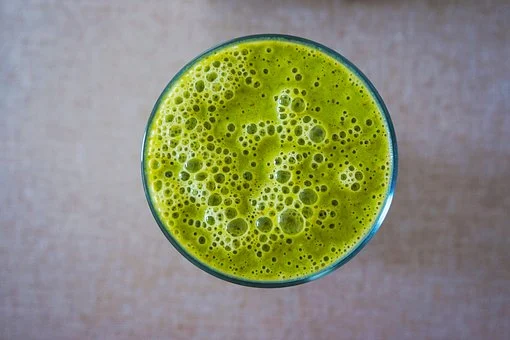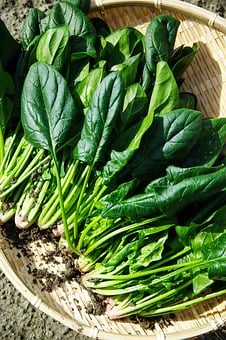When we talk about a balanced diet, we can’t miss the addition of greeny leafy vegetables in our diet as they contain a crucial role in the betterment of our health, and spinach is among one of the nutritious and healthiest green leafy vegetables. While dietary habits are continually changing but spinach genuinely holds an amazing spot in the food industry, due to its high nutritional content.
Raw spinach contains a significant amount of water, carbohydrate, vitamin A, vitamin C, vitamin K, magnesium, iron, folate, manganese. Apart from this, it also contains a notable amount of calcium and iron.
Leaves are consumed about 200years ago by Persia and are known as Persian vegetables. Leaves can be preserved by various methods such as freezing, canning, dehydration. During the first world war, spinach juice was incorporated with wine for injured soldiers to minimize bleeding.

Spinach nutrition
Spinach is a low-calorie, high-energy giving food. The carbohydrate and dietary fiber are particularly notable. Packaged spinach is stored in an airtight container with nitrogen gas to increase the self-life of spinach. Over the period, spinach loses its antioxidant and folate content. The leaves are edible and contain various types of nutrients, but due to photosynthetic cells, vitamin K is abundant in green leafy vegetables. Other than this spinach is rich in:
- Protein
- Vitamin A, B, C, E and K
- Calcium
- Iron
- Magnesium
- Manganese
- Sodium
- Potassium
- Phosphorous
Benefits of eating spinach
We all know that iron and protein are quintessential for the human body. Spinach is loaded with necessary compounds with powerful medicinal properties. Eating spinach is an excellent way to increase nutrients in your diet and fight with following health conditions. Let’s have a look:
Decreases hypertension
Eating spinach could be highly effective for high bp patients as it contains a rich amount of vitamin K, potassium, and antioxidants. Potassium-rich food helps the kidney to flush out sodium from the body which eventually decreases blood pressure.
Healing and repairing muscles
Spinach is a good source of multi-minerals such as magnesium, iron, zinc, which helps in protein synthesis and also heal the body faster by promoting healthy cell division. Fitness enthusiast consumes spinach, in their diet daily because it repairs and strengthens muscles faster.
Moreover, spinach is rich in antioxidants like flavonoids and carotenoids which decrease oxidative stress.
Bone growth
Spinach contains a notable amount of calcium which helps in bone strengthening and growth of bones, it also decreases the onset of osteoporosis risk at an early age. Moreover, spinach could be a perfect solution for those people who are lactose intolerant.

Treatment of Anemia
Due to our lifestyle and eating habits, anemia is very common among people, majorly women and the elderly. Spinach is rich in iron and vitamin k which helps in the formation of RBC. Thus, increasing HB and blood count.
May treat skin disorder
Spinach is abundant in vitamins like C, E, K, and A, which help in the protection of various skin disorders and promote regeneration of skin cells. Further, delays aging, sagging of skin, protection from UV. Rays. Apart from this vitamin, A content helps in preventing breakout and naturally moisturizes the skin.
Improves immunity
Vitamin C is important for regulating and maintaining immunity. Foods like spinach are rich in vitamin C, which boost immunity. Apart from this, spinach also contains a good amount of vitamin A. Thus, preventS infection and inflammation risk.
Improves brain function
Research shows that high concentrations of folate, vitamin C, and vitamin K maintain proper functioning of the nervous system, and protect brain cells from damage. In addition, the antioxidants present in spinach improve the processing capacity of the brain and reduce the oxidation of free radicals.
Delicious ways to use spinach:
The green leafy vegetables have multiple cuisine importance. The leaf is boiled, steamed, stirfried, and consumed raw. Spinach is a common food around the world, especially in South Asian dishes.
You can also make spinach part of your diet regime by making simple diseases from spinach such as saag, tortilla, stewed with pork, spinach kneaded roti, sandwiches, and green smoothies by blending fruit and water with green leaves.

How much quantity of spinach is enough for a day?
Having gone through all the beneficial aspects of spinach, we concluded that it should be an essential part of the diet for the proper functioning of the body. However, there is no side effect of spinach if eaten in limited quantity which depends on, health concerns, habits lifestyle, body weight, and height. Its always advised consulting a dietician or doctor if you have any medical condition before consuming it.
Potential side effects of spinach
High oxalate content
Spinach contains high oxalates which may interfere in the absorption of minerals such as iron, zinc, calcium, and magnesium. Oxalates bind with minerals with them because of which our body did not absorb minerals effectively making us mineral deficient.
Furthermore, a high amount of oxalates may lead to the formation of calcium oxalate stones which can further arise conditions like gout, joint pain, arthritis, and kidney stones. We can minimize the presence of oxalates by boiling the leaf.

Decreases anticoagulant effectiveness
If a person is taking a blood thinner medicament, they should consult a doctor or dietician. It could be harmful as it contains a high amount of vitamin K which can interfere with the effectiveness of the anticoagulant drug.
Stomach distress
It has been found that consuming spinach may alter the metabolization of some individuals as eating too much spinach may cause digestive conditions such as gas, cramps, bloating because of its high fiber content.

Allergic reaction-
Green leafy vegetables contain histamine which may trigger pseudo allergic action such as rashes, itching, pain in some people. Further, Food poisoning may arise due to contamination or improper storage conditions.



